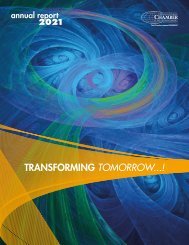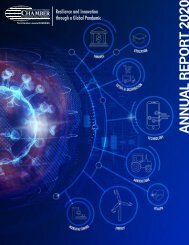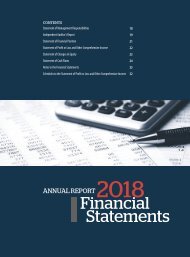Create successful ePaper yourself
Turn your PDF publications into a flip-book with our unique Google optimized e-Paper software.
transforming t&T<br />
2016 2017<br />
Renewable Energy<br />
1<br />
0<br />
-1<br />
-2<br />
-3<br />
-4<br />
-5<br />
-6<br />
2013<br />
2014<br />
2015<br />
2016<br />
Caribbean Sustainable Energy Roadmap and<br />
Strategy (C-SERMS) RE goal:<br />
20% by 2017<br />
28% by 2022<br />
47% by 2027<br />
“Renewable sources of energy are the way forward”<br />
– Robert Le Hunte, Public Utilities Minister, January <strong>2018</strong><br />
T&T RE goal:<br />
2017<br />
10% by<br />
2021<br />
Return on investment<br />
While minister Khan is happy about<br />
all this, he is not so pleased about the<br />
amount of revenue the government<br />
gains from this output. The government,<br />
he says, is therefore “reviewing the<br />
taxation system and the suite of<br />
allowances available to oil and gas<br />
companies.”<br />
This process began with the royalty<br />
rate on production, which was raised to<br />
12.5% in January. Other tax changes<br />
will be announced in due course.<br />
The minister has reassured the<br />
industry that “the government is<br />
receptive to, and welcomes, foreign<br />
investment” – but with the caveat that<br />
“there must be an equitable sharing of<br />
revenue earned from the exploitation<br />
of our hydrocarbon resources.”<br />
The UK’s Poten and Partners, in its<br />
Gas Master Plan report, highlighted the<br />
“great disparity in value”, as minister<br />
Khan put it, “between that which the<br />
government received, as compared to<br />
that received by energy companies and<br />
their affiliates from the monetisation of<br />
the country’s hydrocarbon resources.”<br />
He gave as a sterling example the<br />
revenue impact of the liquefied natural<br />
gas (LNG) trains in Point Fortin. The<br />
“potential value loss from the four LNG<br />
“There must be an equitable<br />
sharing of revenue earned<br />
from the exploitation of our<br />
hydrocarbon resources”<br />
trains averaged around US$6 billion a<br />
year between 2011 and 2014, which is a<br />
staggering figure,” he explained.<br />
Poten and Partners found that<br />
“the beneficiary of the substantial<br />
value generated by the trains was not<br />
so much the upstream gas suppliers<br />
but rather the offshore jurisdictions,<br />
which were either low-priced markets<br />
or high-priced markets, but with the<br />
revenue not flowing back to Trinidad<br />
and Tobago.”<br />
In the majority of transactions,<br />
it was found that “the offtake<br />
arrangements for upstream companies<br />
involved sales to downstream marketing<br />
affiliates, which potentially led to nonarm’s<br />
length transactions.”<br />
Renewable energy<br />
As far as renewable energy (RE) is<br />
concerned, Trinidad and Tobago has<br />
been a late convert. Minister Khan<br />
acknowledges this. “Trinidad and Tobago<br />
recognises the benefits that would<br />
accrue from the diversification of its<br />
energy mix” – but he points out that<br />
it is “the only country in the western<br />
hemisphere that generates 100% of its<br />
power from natural gas, the cleanest of<br />
the fossil fuels.”<br />
A target of 10% of RE in power<br />
generation by 2021 has been set.<br />
According to the minister, a<br />
“suitably qualified international firm,<br />
together with a joint venture local<br />
partner, will be required to design,<br />
build, operate, maintain and fund RE<br />
projects greater than, or equal to, 3MW<br />
for grid integration.”<br />
RE comes basically from the sun<br />
and the wind, but there is also the more<br />
esoteric waste-to-energy approach.<br />
Once there is a landfill, waste-to-energy<br />
becomes a possibility. The minister<br />
confirms that “expressions of interest<br />
have been issued for the development<br />
of a waste-to-energy facility at the<br />
Beetham Landfill for the conversion of<br />
municipal waste for power generation.”<br />
Trinidad and Tobago is a signatory<br />
to the Paris climate change agreement,<br />
36<br />
Trinidad<br />
and Tobago Chamber<br />
of Industry and Commerce<br />
www.chamber.org.tt/contact-magazine

















